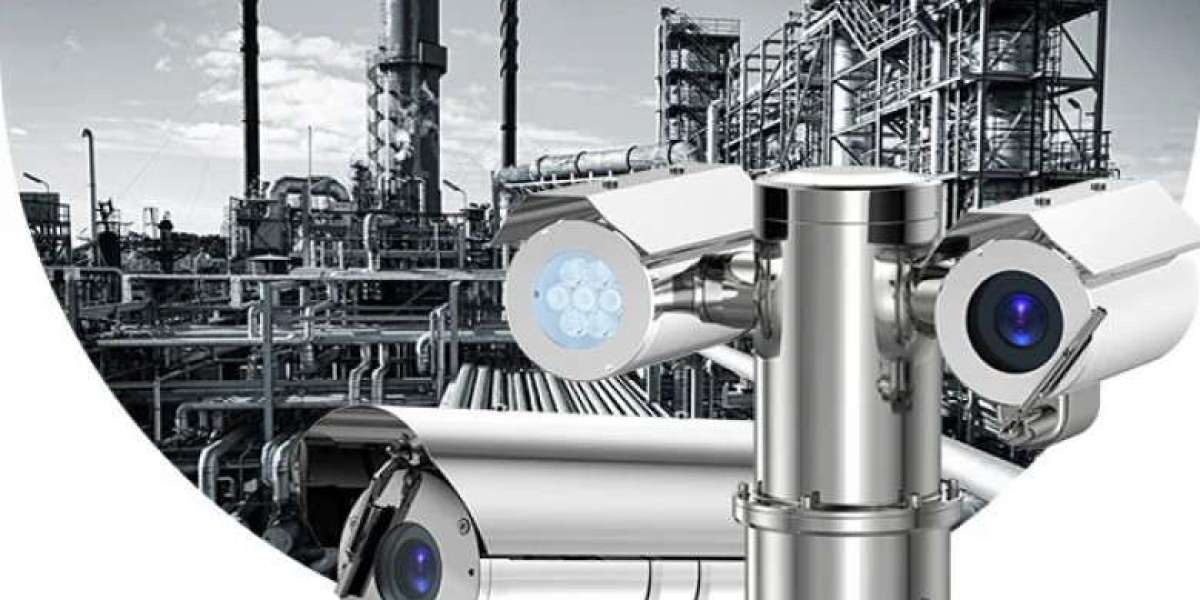Explosion Proof CCTV Camera or an Explosion Protected Camera - If you are involved in a potentially dangerous industry, you may have encountered terms such as these. Quite perplexing terms! We acknowledge that businesses often utilize jargon that seems intended to confuse rather than clarify. "What distinguishes an explosion-protected camera from an explosion-proof camera and a flameproof camera?" is a question frequently posed to us in our field.
In truth, the response is "not much." All three terms essentially convey the same concept, and they pertain to cameras specifically engineered to minimize the risk of explosion. It is beneficial to comprehend the functionality of these cameras across various industries. Before delving into more specifics, let's take a moment to understand what an explosion-proof camera entails in greater detail.
What is an Explosion Proof CCTV Camera?
Operating in potentially hazardous locations poses significant risks. Examples of high-risk environments include food processing facilities, oil and gas operations, chemical plants, oil depots, ship tanks, ferry terminals, and border defense areas. Despite implementing all safety measures and equipping your staff with protective gear, unforeseen incidents can still occur. In such cases, having the ability to receive real-time alerts and respond swiftly, or maintain continuous surveillance on-site, would be invaluable. This underscores the necessity for these sectors to utilize explosion-proof CCTV cameras or cameras that are explosion-protected. So, what precisely constitutes an explosion-proof CCTV camera?
An explosion-proof CCTV camera is a device that has been specifically designed and constructed for use in hazardous and potentially dangerous environments. The camera is housed in a specialized enclosure. Instead of triggering an explosion, the camera system is built to endure an explosion occurring outside its casing. Furthermore, both the camera and its enclosure are capable of preventing the ignition of surrounding gases and dust. They are designed to either contain any internal explosions or to stop sparks from escaping the device and causing an explosion.
Different Types of Explosion-Proof CCTV Cameras
Explosion Proof Bullet Camera
Bullet cameras, often referred to as lipstick cameras, derive their name from their streamlined design that resembles a rifle bullet. These cameras are generally compact, with a length ranging from 2 to 2.5 inches, and they are equipped with a fixed focus lens. The versatile shape of the bullet camera enables its use in both indoor and outdoor settings, and it typically offers an extensive viewing range.
A premium explosion-proof CCTV camera is equipped with a robust stainless steel casing, infrared illuminators, and superior camera sensors. These cameras come with interchangeable lenses. Norden's explosion-protected cameras can be employed in high-risk sectors such as oil refineries to oversee personnel activities and enhance security. Tailored for operation in dangerous industrial settings, Norden's collection of explosion-proof cameras features integrated fibre port support and is ATEX certified, providing enhanced safety.
Explosion Proof Dome Camera
Dome cameras are mounted on the ceiling or the wall and housed in an inverted dome casing, hence the name. The dome is frequently coloured to cover the camera, making it impossible to tell where it is pointing. These cameras are available in a wide range of configurations, including CCTV and IP, fixed and mobile, and outdoor and indoor. Thermal vision, infrared illuminators, daytime use, and tiny and micro versions are all different options available in the market.
Explosion Proof PTZ Camera
PTZ cameras, also known as Pan-Tilt-Zoom cameras, are cylindrical-shaped cameras with a hard-shell dome that conceals the camera's direction from curious spectators. PTZ cameras have greater capabilities and can control zoom and direction from afar. PTZ cameras are often used for security in chemical factories, oil and gas plants, Fireworks factories, etc.
Corrosion-proof Camera
Cameras designed to be corrosion-proof or anti-corrosion, utilized in industrial settings, provide optimal protection through a durable corrosion-resistant coating. Our corrosion-proof cameras, safeguarded by protective coatings and stainless steel housings, are sufficiently robust to endure the harshest corrosive conditions while delivering clear images in difficult environments. The corrosion-resistant construction of these cameras is adaptable, rendering them appropriate for use in petrochemical, naval, submarine, maritime, underwater, and various other corrosive settings.
How do explosion-proof cameras work in different industries?
Let us take a sneak peek at the different high-risk areas where explosion-proof CCTV cameras are of great help.
Oil & Gas Industry
Explosion-proof cameras are easily used in areas with flammable gases. These cameras are appropriate for use in the oil and gas sector. Onshore and offshore installations like rigs, pipelines, and pumping stations can benefit from cameras for monitoring and control.
Refineries and Oil Depots
In this industry, explosion-proof cameras provide valuable data for processes and security monitoring.
Chemical and Pharma Industry
What if a plant operator needs more than simply a measurement from the equipment? What if he had to see it in person? If he had to decide by looking at it through a process inspection window? What if security positions were required for fieldwork? Camera systems have made their way into the chemical industry as "video sensors"!
Mechanical Engineering
Both workers and machines can make better decisions with the help of video monitoring and industrial image processing. Explosion-proof cameras help in the process in this sector, too.
Surveillance or Security
The explosion-proof CCTV camera systems allow companies, power plants, port facilities, and logistical reloading sites to be monitored 24 hours a day, seven days a week.
Biogas Plants
Biogas plants can be regulated and operated more efficiently by deploying explosion-proof cameras.







